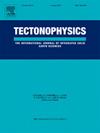Shaping the crustal structure of the SW-Alpine Foreland: Insights from 3D Geological modeling
Abstract
Reactivation processes play a significative role in the localization of deformation but still remain hard to establish at the lithospheric scale. In this work, we built a 3D structural model, which enables to bridge the gap between the main tectonic structures observed at the surface and the geometry of the major interfaces (the Mohorovičić-discontinuity (hereafter Moho) and top of the basement) inferred from geophysical data acquired in the external Western Alps and their foreland. The geometry of these tectonic structures is interpreted in relation to their geodynamic evolution. The main results of this study highlight: (1) a strong contribution of thick-skinned Pyrenean-Provence and Alpine tectonics, (2) a lithospheric rooting of Variscan shear zones and related faults, and (3) the regional-scale influence of these inherited structures on the post-Paleozoic strain localization in the study area. Our 3D model shows that the pattern of Variscan shear zones that were developed at the end of the Paleozoic involved the whole crust, as emphasized by the Moho offsets. These shear zones were reactivated and localized Meso-Cenozoic deformation. The Variscan deformation pattern controlled the geometry of extensional basins, the propagation of Pyrenean-Provence deformation, and finally the Alpine deformation at crustal scale. Our 3D model shows minor crustal thickening (ca. 40 km) located below the Pelvoux External Crystalline Massif, which probably resulted from both Pyrenean and Alpine tectonic phases. In contrast, the southern part of the Alpine front shows a thinned crust (ca. 18 km) resulting from extensional Meso-Cenozoic phases between the Cévennes margin and the Durance basin.

 求助内容:
求助内容: 应助结果提醒方式:
应助结果提醒方式:


